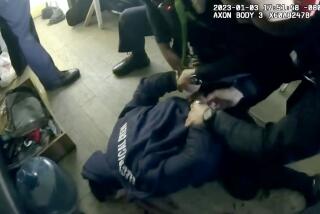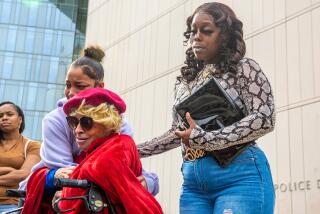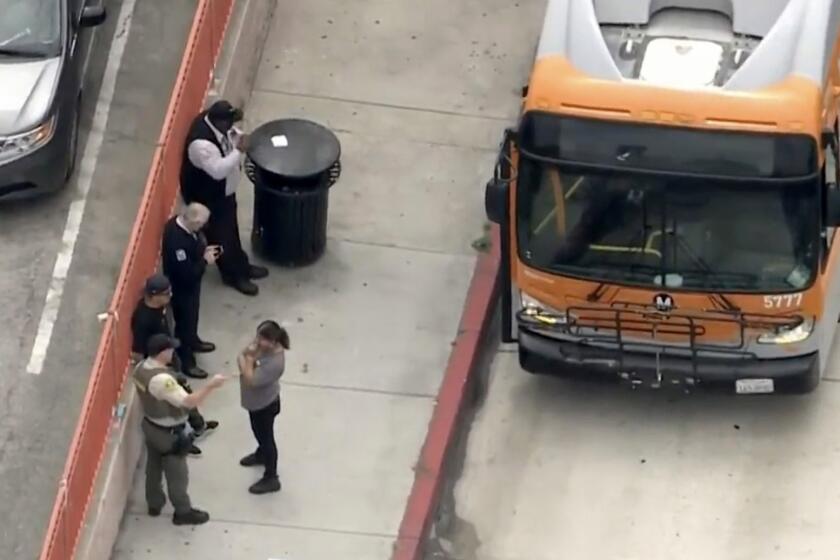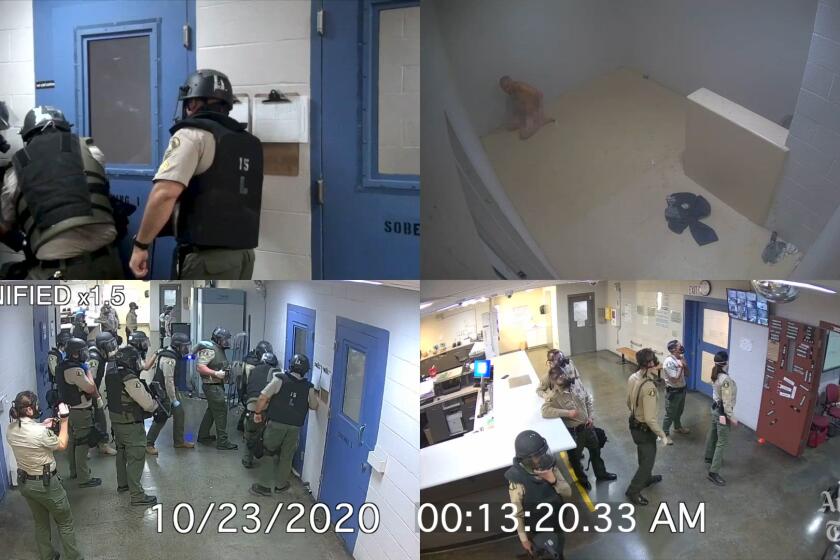Police Commission to Question LAPD About 2 Shootings
Concerned about revelations that two allegedly improper shootings received scant investigation from the LAPD, Police Commission President Raquelle de la Rocha said Wednesday she will convene a closed-door meeting next week to question department officials about their handling of the cases.
De la Rocha said she wants to know how detectives prioritized the hundreds of corruption leads they received as a result of interviews with Rafael Perez, a former Los Angeles police officer who detailed alleged police misconduct in return for a break on his sentence for stealing cocaine from an evidence locker.
“They are going to have to explain their actions,” De la Rocha said.
The commission president called for the meeting after a report in The Times on Saturday disclosed that detectives have yet to interview the victims and other key witnesses in two shootings identified 18 months ago by Perez. According to Perez, those shootings were improper, and the wrongdoing was covered up.
Los Angeles Police Department officials said the investigations into those shootings were not considered high priorities because the officers who fired their weapons were not considered “major players” in the scandal. Other officers involved in the shootings, however, were among those who Perez has said were “in the loop” of allegedly rogue cops at Rampart.
An LAPD spokeswoman also said detectives were deluged with investigative leads that seemed more promising than the allegations about the two shootings.
De la Rocha, however, said she believes accusations of unjustified shootings should be among the department’s top investigative priorities.
“I can’t imagine anything being of a greater importance,” she said. “We’ll have to see what the department’s rationale was.”
If the detectives were overburdened with leads, she said, the department should have added more staff to the task force.
The commission’s action represents a stepped-up effort by the panel to exert more oversight on the department’s criminal investigation into police corruption, De la Rocha said.
She was joined by Commissioner Dean Hansell, the panel’s vice president, who said he too was troubled by the details about the LAPD’s handling of the cases. “I will be very interested in receiving the department’s response,” he said.
The first shooting, involving a rookie police officer, occurred on Oct. 15, 1995. Department officials acknowledge that the shooting has received virtually no scrutiny by detectives on the corruption task force.
According to the official police account of the incident, officers were searching a darkened apartment for a man who allegedly hit his wife. Suddenly, a bedroom door flew open and Jose Vega, the man the officers were looking for, was standing there holding something shiny near his waistband, police said. The rookie officer said he heard a “boom” and saw a flash of light that he believed was a muzzle flash. The officer said he thought he had been shot and fired one round at Vega, striking him in the stomach.
After the shooting, officers searched for a gun, but could not find one. Instead, they said, they found a hand mirror near where the injured man collapsed.
Vega, who received a $425,000 settlement from the city, alleged in his lawsuit that he was asleep when the rookie officer knocked on his bedroom door and that when he answered it, the officer shot him. Vega said the mirror was placed on the floor by officers who apparently were trying to justify the shooting. Other witnesses--some of whom were interviewed by police--backed elements of Vega’s story and disputed some of the officers’ statements.
In his interviews with detectives, Perez said the shooting was a mistake by the rookie and that police at the scene helped cover it up so he wouldn’t lose his job.
One sergeant who Perez said helped in the alleged cover-up was Edward Ortiz--a key figure in the corruption scandal. Ortiz, through his attorney, has declined to comment.
Although Perez offered few details of the second incident, detectives identified it as the Feb. 21, 1998, shooting of an alleged gang member named Anthony Dickson.
According to the police report on that shooting, two officers from the 77th Street Division anti-gang CRASH unit were attempting to stop Dickson and question him. He ignored their command and tried to flee, according to the police account at the time. The officers said Dickson pointed an assault rifle at them. One officer then fired two rounds at Dickson, striking him in the leg. Though he was hit, Dickson continued to flee. He collapsed a short distance later and was arrested.
A magazine with live ammunition was recovered at the scene but the rifle was never found. According to police reports, Ortiz was the one who found the evidence.
Dickson’s account of the shooting differed sharply from the police version. He says he never had a gun during the incident and was shot by police as he scaled a fence. He has given conflicting stories on whether he was carrying the ammunition.
Witnesses and physical evidence, however, contradicted parts of the officers’ account, according to court records. In fact, the deputy district attorney who was prosecuting Dickson on the allegations of assaulting the police was so troubled by the lack of evidence supporting the officers’ version that he allowed Dickson to enter a plea agreement that set the young man free after serving only 10 months in jail. The prosecutor asked his colleagues responsible for prosecuting police to look into the case for possible criminal charges against the officers.
Dickson sued the city and was awarded $135,000 to settle the case outside of court.
The LAPD’s corruption task force detectives said members investigated the shooting, but they concluded there was no evidence of criminal conduct by officers. They reached that conclusion without interviewing Dickson, key witnesses, the officers and the prosecutor who had voiced concerns about the officers’ account.
More to Read
Start your day right
Sign up for Essential California for news, features and recommendations from the L.A. Times and beyond in your inbox six days a week.
You may occasionally receive promotional content from the Los Angeles Times.







